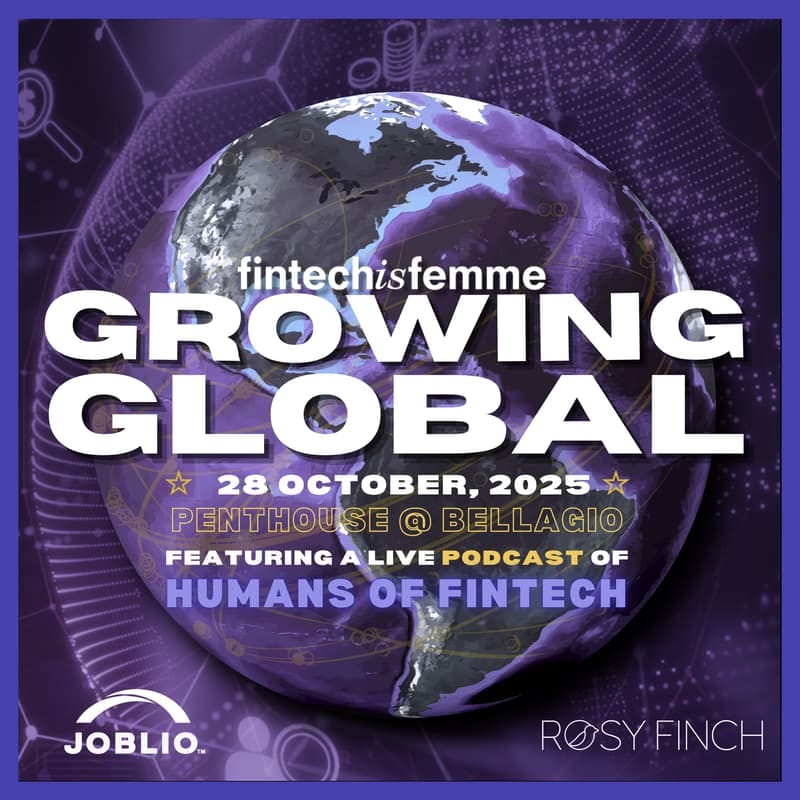- Fintech Is Femme
- Posts
- 🤑 Choose Joy. Build Fintech. Take Action.
🤑 Choose Joy. Build Fintech. Take Action.
What Washington’s shutdown means, how Garima Shah is rewriting the growth playbook, and the fintechs redefining global wealth.

Hey, fintech fam! 💜
Earlier this week, I had the honor of attending the Equality Now Gala with Stefany Bello, representing Fintech Is Femme alongside Mastercard.
The theme? Choose Joy.
And wow — that landed.
Because, like many founders, I’ve been heads-down—working to stay grounded, to make an impact, and, let’s be real, to tune out the noise.
The political noise. The social chaos. The endless stream of fear that fuels clicks.
But here’s the truth: when we’re stuck scrolling, we’re not creating. And creation is action.
If building Fintech Is Femme has taught me anything, it’s that storytelling, curating rooms, and designing experiences rooted in joy — that’s how we move forward.
That’s why I’m so energized for what’s next.
We’ve got events at Money20/20 and a virtual showcase coming up (check the events section below to RSVP — they’re filling fast!).
For today’s issue: a look at Washington’s next move, an interview with one powerhouse founder, and a Humans of Fintech throwback you won’t want to miss.
Let's get into it.
#TRENDING
#1 What the Government Shutdown Means for Fintech

Another week, another missed vote — and another extension of uncertainty.
The Senate failed again to pass a government funding bill, sending lawmakers home and pushing the shutdown into next week.
The immediate fallout of the shutdown is informational: key agencies like the Bureau of Labor Statistics are suspending operations, delaying critical economic data like the jobs report and CPI, according to J.P. Morgan.
That means the Federal Reserve is flying partially blind as it debates the next round of rate cuts — potentially in October — and that uncertainty filters through every layer of finance.
“For as long as the government shutdown goes on, we’ll be operating a little bit blind,” said Michael Feroli, Chief U.S. Economist at J.P. Morgan.
Every week the government stays closed shaves roughly 0.1% off annualized GDP, according to JPM. That may sound small, but if the shutdown drags on, it can compound — dragging on consumer confidence, hiring, and even fintech usage metrics that depend on discretionary spending.
The longer it lasts, the murkier it gets — especially as delayed data distorts investor sentiment and pricing models that startups and institutional players both rely on.
What It Means for Banking (and Fintech by Extension)
While large banks can typically absorb short-term shocks, community and regional banks feel shutdowns first — and that matters, because they’re the backbone of local lending and often key partners for fintechs.
As Anna Kooi, Financial Services Practice Leader at Wipfli, explained in BAI by ProSight:
“Community and regional banks lack geographic diversification, have more concentrated client bases, and rely on relationship-driven deposits.”
Translation: when the flow of federal payments slows or stops, liquidity tightens.
Here’s what fintech leaders should be watching right now:
Liquidity & Deposits
Delayed inflows — from government contractors, veterans, or agricultural payments — can pressure liquidity. Some banks may draw on wholesale funding or Federal Home Loan Bank lines to bridge the gap. If stress extends, consumers may dip into deposits to cover expenses, creating potential deposit flight.
Credit & Lending
With less clarity on economic data, lenders may tighten underwriting or delay decisions. For fintech lenders and neobanks, this could translate to slower credit approvals, higher risk pricing, and thinner net interest margins.
Compliance & Oversight
Shutdowns pause certain federal supervision activities, but regulators often backload exams when they return — meaning heightened scrutiny later. Smart institutions use this lull to audit liquidity, stress-test their portfolios, and document board oversight.
Kooi’s advice for banks — and fintechs relying on them — is tactical and clear:
Monitor liquidity daily
Pre-stage funding collateral with the FHLB and Fed
Tighten vendor oversight, especially if your partners depend on government data sources (IRS, SBA, etc.)
Run contingency tabletop exercises for prolonged disruption scenarios
Fintech’s Ripple Effects
The shutdown also hits fintech more directly than many founders realize.
Data Delays: Many regtech and risk platforms depend on federal data feeds — think tax verification, SBA loan status, or KYC cross-checks. Those may go dark, forcing fintechs to find private substitutes or implement manual processes.
Partner Dependence: Fintechs that rely on community bank partners could see slower response times or liquidity constraints.
Market Mood: Even if financial markets remain steady (and historically they do), investor confidence can dip. Expect more cautious capital deployment and extended diligence cycles until visibility improves.
Still, there’s a silver lining: uncertainty often accelerates discipline.
The fintechs that win through cycles like this are the ones that prepare — not panic.
As Kooi puts it,
“Institutions that emerge strongest treat any lull as a time to get ahead, not relax.”
That means doubling down on resilience: tightening risk models, shoring up liquidity, communicating transparently with customers, and keeping your regulators — and investors — informed.
The Big Picture
Historically, government shutdowns have had limited long-term market impact. But fintech isn’t just “the market” — it’s a web of partnerships, APIs, and payment rails that depend on both confidence and compliance.
When the system slows down, fintech gets tested.
For founders, this moment is about control:
You can’t control Washington, but you can control your cash flow visibility, vendor dependencies, and communication strategy.
As Capitol Hill plays politics, keep your systems clean and your storytelling clear, because fintech doesn’t stop — even when the government does.
#2 How Garima Shah’s Biller Genie is Rewriting Fintech’s Growth Playbook

Biller Genie president and co-founder Garima Shah
If the first story was about what happens when Washington shuts down, this one’s about what happens when fintech builds up — focused on longevity, not burn rate.
Meet Garima Shah, founder and president of Biller Genie, a B2B SaaS platform automating accounts receivable (A/R) for small and midsize businesses — the ones that make up the backbone of the economy.
In a world where 64% of SMBs face delayed payments, Shah is tackling one of the least “sexy” parts of fintech — invoicing.
But it’s how she’s building that makes her story matter most right now.
Shah’s philosophy — and Biller Genie’s company motto — is simple:
“Automate. Integrate. Simplify.”
That’s the blueprint for how fintech should function.
Biller Genie automates the entire A/R process — syncing invoices, sending reminders, reconciling payments — and plugs directly into existing accounting software so SMBs don’t need to overhaul their systems.
It’s enterprise-level efficiency for businesses with $500K–$5M in revenue — landscapers, florists, mechanics — where cash flow is survival.
The results?
40% fewer overdue invoices
15 days faster on payments received
10–20 hours saved per week on admin work
That’s time and money back to founders who actually need it.
“Stop Building for the Exit”
My favorite takeaway from Shah? Her refreshingly honest take on venture capital.
“If you’re building a company just for an exit,” she told me, “you’re building the wrong company.”
It’s a statement that cuts deep in an industry obsessed with valuations, unicorn lists, and “how much did they raise?” headlines.
Shah has a different metric: sustainability.
In five years, Biller Genie has quietly become one of fintech’s rare success stories — scaling nationally and processing millions of payments.
And while I can’t share Biller Genie’s exact revenue figures, Shah did leave me with this:
“Profits are like a little black dress,” she said. “They never go out of style.”
VC Culture and the Cost of Overfunding
Shah’s take on venture money is sharp and unfiltered:
“VC money has actually stopped our industry in some big ways,” she said. “People spend to spend — not to solve a problem.”
She points to the vicious cycle we’ve all seen: startups raise hundreds of millions, hire too fast, burn through capital, and then cut 30% of their workforce six months later.
“All that means to me,” she said, “is you convinced someone to give you money based on a projection you can’t fulfill.”
Shah’s approach is product-first, revenue-led, and proudly lean.
“We hire fast and fire fast,” she said. “But it’s not about being ruthless — it’s about maintaining excellence. Don’t be the bottom 10%. That’s how you build strong culture.”
Fintech Is Just Business — Don’t Overcomplicate It
There’s a clarity in the way Shah speaks that cuts through the noise.
“Fintech isn’t some mysterious new species,” she said. “It’s business. You make more money than you spend. You build a product people actually want. That’s it.”
Her candor lands because she’s right. Somewhere along the way, media narratives traded fundamentals for flash — measuring success by funding rounds rather than revenue.
Shah’s company is proof that the basics still work:
Build something useful.
Price it fairly.
Serve your customers well.
Biller Genie isn’t just modernizing invoicing — it’s building connective tissue between Main Street and the fintech ecosystem.
For community banks and credit unions — which serve roughly 60% of small business lending and 80% of agricultural loans — fintechs like Biller Genie act as essential partners. They bring automation to the places where manual processes still dominate.
And for fintech founders, Shah’s model offers a counterpoint to the “raise or die” narrative:
Build for resilience, not recognition.
The Power of Saying No
As Biller Genie scales globally (its new Belfast office opened this year), Shah remains relentlessly focused.
“Everyone asks, ‘Why don’t you add payroll or expense management?’ Because we could do all of those things,” she said, “or we could be really good at one.”
It’s a masterclass in product discipline — something too many fintechs forget in pursuit of “total platform” status.
“You should have no more than two success metrics,” Shah said. “Everyone at your company should know them. Everything else is noise.”
The Bigger Lesson: Redefining Success
When I asked Shah what she thought fintech’s biggest misconception was, she shared:
“We celebrate how much people raise, not how much they earn.”
That, she believes, is what’s keeping more women and underrepresented founders from entering fintech.
Because when the standard of success is a $100M raise — not $10M in profitable revenue — the system tells an entire generation of builders they’re not ambitious enough.
“We need to stop glorifying the burn,” she said. “Stop chasing unicorn status and start building companies that last.”
#3 Redefining Wealth-Building in Latin America

This week on Humans of Fintech, I’m throwing it back to my interview — live on Nasdaq’s trading floor — with Carlos Díaz, Co-Founder of RUUT, Mexico’s largest Registered Investment Advisor, to talk about inclusion, innovation, and investing for the next generation.
RUUT is changing the game for first-time investors (average user age: just 24!) — and nearly 60% of its user base are women.
That’s powerful when you consider the data: women investors consistently outperform men over time thanks to lower-risk strategies, long-term thinking, and stronger diversification.
With millions in assets under management and six figures in returns generated for its community, RUUT is proving that wealth-building in Latin America isn’t just possible — it’s scalable.
We got into:
What it means to design for non-investors
Why building for women isn’t a niche
How UX can drive trust and outcomes
What’s next for fintech across Latin America
If you care about inclusive finance, next-gen innovation, or building fintech that actually impacts real-world markets, this one’s a must-listen.
MARK YOUR CALENDARS
Join us every Thursday to stay up to date on our fintech events!
[LAS VEGAS] Growing Global at Money20/20
At Money20/20, we’re hosting an exclusive breakfast and live Humans of Fintech recording from the Lakeview Penthouse at the Bellagio, uniting founders, operators, and investors driving cross-border innovation.
Join me and two incredible leaders — Jessica Johnson, CEO of Rosy Finch, and Remy Sirls, Executive Director of the Joblio Foundation — as we explore the human stories and bold strategies shaping fintech’s next chapter across borders.
If you’re building globally (or ready to start), this is the room to be in.
[LAS VEGAS] A Toast to Women in Fintech

Join us for the Toast to Women in Fintech at the Bellagio Penthouse.
[VIRTUAL] The Future of Fintech: Best in Show
I’m so excited to partner with Empire Startups to spotlight the next generation of women redefining money as we know it.
From lending to payments, wealth to insurance, capital markets and beyond — these founders aren’t just building companies, they’re building the future.
At each event, five early-stage startups will take the virtual stage. A panel of top investors will weigh in. And together, we’ll crown fintech’s Best in Show.
This isn’t just another pitch event — it’s where ideas meet capital, culture, and community.
✨ Register here to attend (it’s virtual, join from anywhere!)
FINTUNES
Doja stepping into her Janet Jackson era — and I’m so here for it.

LET’S CONNECT
📰 Share this newsletter with a friend and start growing your network.
🔗 Connect with me on LinkedIn for daily insights on leadership.
🤝 Meet the industry leaders who can change your career at the Leadership Summit.
📣 Promote yourself to 50,000 subscribers by sponsoring this newsletter.
🎤 Host an epic event by booking me as a speaker, moderator, or emcee.
📚 Increase your expertise by ordering your copy of my book, Fintech Feminists: Increasing Inclusion, Redefining Innovation, and Changing the Future for Women Around the World.
⭐️ P.S. If you’ve read Fintech Feminists (or listened to the audiobook!), I’d be so grateful if you could take 30 seconds to leave a review or rating on Amazon here. Your support means the world to me. A million thanks in advance!
That wraps up today’s edition—thanks for reading!
Until next week, keep innovating and challenging the status quo. See you Tuesday!
Love,
Nicole 💜
